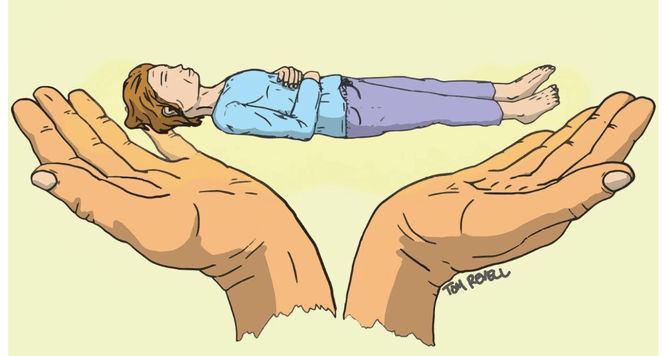In this article, Samantha Greenway dives deeper into the wellness industry and goes with the flow to investigate the Reiki Energy
Rebalancing your vibrational field to allow your energy to flow freely might not be the most straightforward concept to grasp. It’s a practice known in the West as reiki. It was developed in Japan, early last century.
Rei translates from Japanese as universal life, and ki, means energy. During a session, practitioners place their hands lightly on, or near, the body (clients can stay fully clothed, lying down or comfortably sitting up) to allow what the professional organisation, Reiki NZ, describes as “a free flow of universal energy”.
The aim is to encourage emotional or physical healing. The question is, do you need to believe in it, for it to work?
“You don’t have to be spiritual, intuitive or even believe in it,” says Natalie Reynolds, reiki master at Tonic Room, a centre for holistic health in Auckland.
“Just be open to receiving it. You can meditate or chat while it’s happening; the reiki will flow through regardless. People sometimes say they feel ‘weighed down’, or they are ‘carrying stress on their shoulders’. Both are energetic phrases. Holding that negative energy can affect us physically and emotionally.”
The idea is that the attuned reiki practitioner will shift energetic blockages and create balance. “You just need to be open to receiving the loving healing energy,” says Reynolds.
A study in The Journal of Pain and Symptom Management found that, “reiki therapy may result in positive physical sensations and symptom relief in hospice patients and their caregivers, with no reported side effects. Further study is needed to better understand this phenomenon.”
No further study is required to understand the value placed on reiki at Dove Hospice and Wellness in Auckland.
“It is a simple, safe, and non-invasive therapy we can offer to anyone, any stage of their illness trajectory,” says body therapist Linda Browne.
After having reiki, “Patients report feeling a sense of peace, stillness, and comfort and a connection with something bigger than self.”
it is part of Reiki NZ’s five-year plan to raise awareness of the benefits of the practice and encourage its use in the public health system
Similarly, Reiki is used to support patients undergoing cancer care at hospitals in the US and the UK.
The Sam Buxton Sunflower Healing Trust is a charity that has funded reiki and energy healing for cancer patients and their families as a complementary therapy within the UK’s National Health Service and other health-related areas.
They call it “healing support”
While Mary Hambly, vice-chairperson of Reiki NZ, notes there is no regular reiki in hospitals anywhere in New Zealand right now, it is part of Reiki NZ’s five-year plan to raise awareness of the benefits of the practice and encourage its use in the public health system.
Even those who have trouble wrapping their heads around the idea of energy healing, can probably recognise its value in reducing stress.
“Reiki promotes a meditative state, in terms of brain waves and calming effect, the reduction in blood pressure, stress hormones and heart rate,” says Hambly.
“We know we need to be in a calm, relaxed state for self-healing to take place. The reiki practitioner facilitates that. There can be some co-regulation there: the practitioner is in a calm, relaxed state and can support the client to join them.”
There are various factors at play when receiving reiki therapy. Grant Schofield, professor of Public Health at AUT, highlights the power of belief.
“In modern medicine, you take something to get better. With an alternative treatment like Reiki, modern medicine has difficulty; it’s not designed to notice anything that doesn’t come from big pharma.”
Anecdotal evidence is valuable.
“Even if something isn’t scientifically proven to work,” says Schofield, “If you believe the treatment works, then we know the placebo effect can be incredibly powerful. That is a proven fact.”
Schofield also believes the benefits of touch, relaxation and empathy should not be discounted.
“Human touch and a physical connection seem to be something that humans crave and respond well to,” says Schofield. “Practitioners can also be very good at listening, at health-coaching.”
And environment plays its part, too: “They are in a space where they can feel relaxed, safe.”
As with any therapy, it can help if you find a connection with the person you receive it from. That’s why Reiki NZ suggests you have a conversation with your practitioner before you commit: you are more likely to feel the benefits if you are able to relax.
- Sunday Magazine, The Post, NZ










